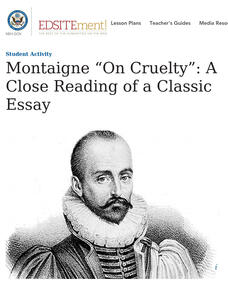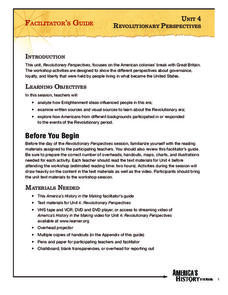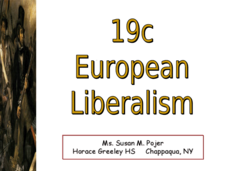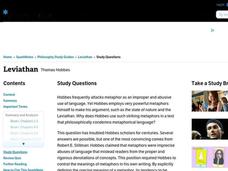National Endowment for the Humanities
Montaigne “On Cruelty”: A Close Reading of a Classic Essay
An excerpt from Michel de Montaigne's essay "On Cruelty" provides advanced readers an opportunity to polish their close reading skills. Scholars read the passage twice and then respond to the provided questions.
Annenberg Foundation
Revolutionary Perspectives
Life, liberty, and the pursuit of happiness. Learners go to the heart of the causes of the American Revolution. Examining political cartoons, Enlightenment documents, and firsthand accounts, they present their ideas and reflective...
iCivics
Why Government?
Why do people create governments? Where did we get our ideas about government? This is a fantastic introductory lesson for your American government class that begins by reviewing the philosophies of Thomas Hobbes and John Locke in...
Curated OER
The Age of Reason and Enlightenment
A presentation that truly covers the age of reason and enlightenment. Nearly every facet, event, and key player in 18th Century Age of Enlightenment is covered. The information is clear, easy to follow, and lends itself well to note...
Curated OER
The Enlightenment: Matching Activity 4
Just finished reading about the 17th century and the period of Enlightenment? Use this helpful worksheet that covers the people and events your class has just read about. Learners can use this resource to match ten different...
Curated OER
The Enlightenment in Europe: Ch 22
Why study European Enlightenment? Because our governing forefathers and constitution were shaped by their words and philosophies. Presented here are facts and achievements of 8 different figures from the enlightened era. Also included is...
Curated OER
19c European Liberalism
If you'd like to prompt some great discussions in your history class, this presentation will surely get your class talking. Addressing 19th century liberalism in Europe (including influences from England, France, America, and Ireland),...
Curated OER
The Enlightenment: Matching #5
The enlightenment was a time of growth for parts of the world, and its spirit inspired future generations. Learners match ten descriptions to the proper person or item definitive of the enlightenment.
Curated OER
How Man Negotiates Away His Natural Freedom
Young scholars recognize that our legal-political system hasdeveloped through a process of moving from philosophical ideals to compromised working models. They apply John Locke's views to the development of U.S. political theory and...
Curated OER
An Essay Concerning Human Understanding - Essay Questions
In this literature worksheet, students respond to 29 short answer and essay questions about Locke's "An Essay Concerning Human Understanding." Students may also link to an online interactive quiz on the novel at the bottom of the page.
Curated OER
An Essay Concerning Human Understanding Quiz
In this online interactive reading comprehension worksheet, students respond to 15 multiple choice questions about Locke's "An Essay Concerning Human Understanding." Students may submit their answers to be scored.
Curated OER
Leviathan
In this online interactive history worksheet, students respond to 10 short answer and essay questions about Leviathan by Hobbes. Students may check some of their answers on the interactive worksheet.
Curated OER
Essay Concerning Human Understanding
For this online interactive philosophy worksheet, students respond to 25 multiple choice questions about Locke's "Essay Concerning Human Understanding." Students submit their answers to be scored.
Curated OER
Leviathan
In this online interactive philosophy activity, students respond to 17 multiple choice questions about Hobbes's Leviathan. Students submit their answers to be scored.
Curated OER
Some Thoughts Concerning Education
In this online interactive philosophy instructional activity, students respond to 10 short answer questions about Some Thoughts Concerning Education by Locke. Students may check some of their answers on the interactive instructional...
Curated OER
Four Enlightenment Thinkers
Students examine lives, philosophies, and political beliefs of four Enlightenment Thinkers: Baron de Montesquieu, Jean-Jacques Rousseau, Thomas Hobbes, and John Locke. Students then work with partner to write short speech from...
Curated OER
Locke, Rousseau, the "State of Nature," and the Social Compact
In this Enlightenment worksheet, students read a paragraph and visit the noted Web sites to find the information to respond to 10 short answer questions about the philosophy and philosophers of the era.
Curated OER
Some Thoughts Concerning Education
In this online interactive philosophy worksheet, students respond to 20 multiple choice questions about Some Thoughts Concerning Education by John Locke. Students may submit their answers to be scored.
Curated OER
Locke's Second Treatise on Civil Government
In this online interactive history worksheet, students respond to 10 short answer and essay questions about Locke's Second Treatise on Civil Government.
Curated OER
Unit 12: Enlightenment and French Revolution
For this Enlightenment lesson, students respond to 34 short answer questions about John Locke, Thomas Hobbes, Baron de Montesquieu, Jean Jacques Rousseau, Voltaire, Denis Diderot, and Mary Wollstonecraft.
Curated OER
Ideas of John Locke
In this life, liberty, and property worksheet, students read about the influences of John Locke and then write a short story on the back of the page. Students write about how life, liberty, and property have influenced them and their...
Curated OER
The Age of Absolutism
In this online interactive world history worksheet, high schoolers answer 9 multiple choice questions regarding French history. Students may submit their answers to be scored.
Curated OER
The Age of Absolutism (3)
In this online interactive social studies worksheet, learners answer 9 multiple choice questions regarding the Age of Absolutism. Students may submit their answers to be scored.
Curated OER
People of the Enlightenment -1600s & 1700s
In this people of the Enlightenment study guide worksheet, students read the notes provided regarding Locke, Hobbes, Rousseau, Montesquieu, and Voltaire.

























